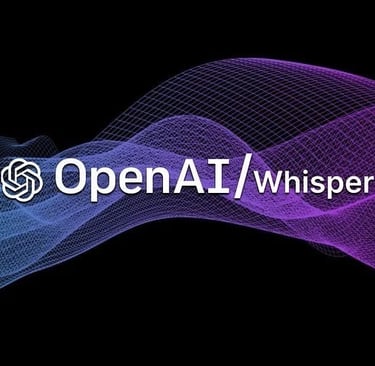OpenAI's Whisper in Healthcare: Promise, Limits, and Hallucinations
Explore how OpenAI's Whisper tool is being used in healthcare, the challenges it faces with transcription accuracy, and the impact of "hallucinations" on medical records.


In recent years, AI-powered transcription Model like OpenAI's Whisper have emerged as transformative solutions across various sectors. Among these, healthcare holds some of the most promising applications. By swiftly converting spoken language into text, Whisper aims to reduce the workload for medical professionals, improve patient documentation, and ultimately lead to more efficient healthcare delivery. However, recent studies highlight a concerning phenomenon within AI transcription—"hallucinations," where the AI invents content that wasn’t said, raising critical questions about its reliability in a high-stakes field like healthcare.
Whisper’s Core Strengths in Healthcare
Whisper is designed with advanced natural language processing (NLP) models that can recognize and transcribe human speech in real-time, regardless of accent, language, or background noise. The potential impact on healthcare is immense:
Increased Efficiency: Whisper aims to save time for physicians by automating note-taking, reducing paperwork, and letting doctors focus more on patient care.
Consistency and Accessibility: With the ability to transcribe diverse languages and dialects, Whisper could bridge gaps in multilingual care, providing more consistent documentation for diverse patient populations.
Scalability: Whisper’s AI capabilities mean it can handle large-scale transcription needs, making it ideal for busy hospital environments where time is of the essence.
The Issue of “Hallucinations” in AI Transcription
While Whisper’s potential is clear, it isn’t without challenges. Whisper, like many other language models, may sometimes produce text based on statistical associations rather than actual spoken words, leading to "hallucinations." In healthcare, even a minor inaccuracy in a medical transcript can result in misdiagnosis or inappropriate treatment plans. Studies have found that these AI "hallucinations" are not isolated to Whisper; however, their impact in healthcare settings highlights unique and critical risks.
Why Do Hallucinations Happen?
AI transcription tools like Whisper rely on vast datasets to “learn” patterns and likely interpretations in spoken language. However, these models are still imperfect and can struggle with:
Ambiguous Phrasing: AI models may incorrectly interpret nuanced or ambiguous phrases, adding speculative or extraneous details.
Medical Jargon Misinterpretation: Medical terminology is complex, and if Whisper’s dataset lacks sufficient examples of specific terms, it may default to similar-sounding non-medical words.
Contextual Gaps: In cases where patient conversations are fragmented or include noise, the model may attempt to “fill in” perceived gaps, leading to hallucinated content.
Real-World Case Studies and Insights
Some hospital studies that trialed Whisper observed instances where the tool added unspoken phrases to patient notes, an alarming occurrence in medical documentation. For instance, rather than solely transcribing accurate diagnoses, hallucinations could potentially lead to erroneous documentation in sensitive areas, such as symptom descriptions, medication dosages, or family medical history.
Hospitals implementing Whisper have had to incorporate additional checks and balances to minimize risks, often assigning human professionals to review all transcriptions.
Addressing the Challenge: Balancing Efficiency and Accuracy
OpenAI and healthcare providers are exploring various strategies to improve Whisper’s effectiveness in clinical settings:
Enhanced Training Data: Expanding Whisper’s training data to include more healthcare-specific language and situations can help it better understand and accurately transcribe medical terminology.
Hybrid Approaches: Some providers combine Whisper’s transcription with human oversight to maintain accuracy and address hallucination risks.
Feedback Loops and Model Retraining: Continual refinement based on user feedback can allow OpenAI to adjust Whisper’s algorithm, especially in fields requiring high accuracy like healthcare.
Ethical and Practical Considerations
As AI tools like Whisper become embedded in healthcare, ethical considerations become paramount. Patients and healthcare providers need transparency regarding AI’s limitations and potential errors. Moreover, any hallucinations in patient records can lead to legal issues, with potential impacts on patient trust in AI-assisted healthcare. OpenAI, therefore, must work closely with regulatory bodies to set clear standards for AI application in clinical contexts.
Future Outlook
AI-driven tools hold tremendous potential to improve healthcare, yet the ongoing issues with hallucinations underline the need for continuous research and improvement. OpenAI’s Whisper, with its promising transcription capabilities, could redefine the role of AI in healthcare if these challenges can be mitigated. In the coming years, innovations in data processing, improved algorithmic transparency, and stringent accuracy checks could well make AI transcription an invaluable and trustworthy partner in patient care.
Conclusion
OpenAI’s Whisper represents a step forward in healthcare transcription, offering automation that could alleviate administrative burdens on medical professionals. However, the issue of hallucinations cannot be ignored, as it directly impacts patient safety. Ongoing research, regulatory frameworks, and technological advancements will be crucial in bridging the gap between Whisper’s capabilities and the stringent demands of healthcare.
Transform Your Healthcare Documentation with XpndAI’s Transcription Agent!
Streamline medical records and enhance accuracy with XpndAI’s healthcare transcription agent. Our AI-powered solution minimizes human errors and transcribes complex medical terminology seamlessly, allowing healthcare professionals to focus on patient care.
Use Cases:
Real-time Patient Documentation: Fast, accurate transcriptions during consultations.
Specialized Medical Transcriptions: Easily handles jargon and complex terms.
Efficient Administrative Support: Reduces documentation workload for support staff.
Ready to optimize your practice? Book a call below and discover how XpndAI can elevate your healthcare operations!